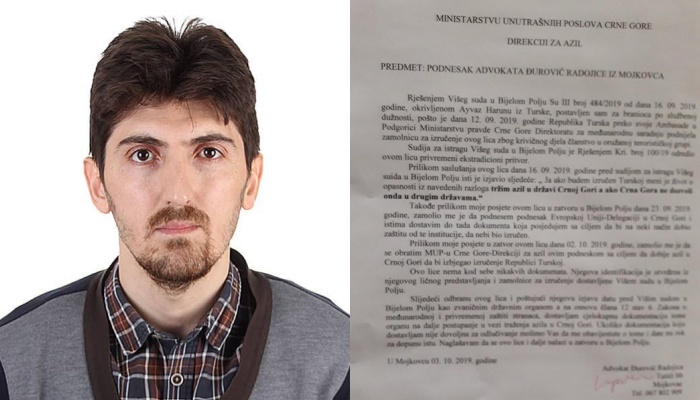The Higher Court in Montenegro has again ruled to extradite Harun Ayvaz, a faith-based Gülen movement follower, to Turkey, where he is wanted for alleged terrorism offenses, Balkan Insight (BIRN) reported.
The ruling, made on Oct. 14, came after the Podgorica-based Appeal Court overturned the Bijelo Polje court’s previous decision that said Ayvaz should be extradited to Turkey.
Dalibor Tomovic, a human rights lawyer who is now representing Ayvaz, told BIRN that he would challenge the latest ruling.
“I officially received the case yesterday and we will appeal the decision in the next three days,” Tomovic said.
Tomovic argued that the decision was not in line with Montenegro’s constitution or international law.
“With this decision, the higher court in Bijelo Polje accepted the reasoning of Turkey for extraditing Ayvaz. The reasons include that the Gülen movement is a terrorist organization and that having account at Bank Asya is a proof of being a terrorist,” Tomovic explained.
According to his wife, Ayvaz is accused of subscribing to the Gülen movement’s Zaman newspaper, of using the Bylock application on his phone, which a Turkish court has ruled is a sufficient proof to link a user with the Gülen movement, and of depositing money into an account at Bank Asya – a bank with connections to the movement.
Tomovic alleged that Montenegro is keeping Ayvaz in custody for political reasons.
If the Appeal Court in Podgorica now rules that Ayvaz can be extradited, the Justice Ministry will make the final decision on whether to send him to Turkey or not.
However, Tomovic said that Ayvaz also has a parallel application for asylum, which he submitted on Oct. 24.
“Even if the Appeal Court and the Justice Ministry decide to extradite him, they have to wait to hear the final decision about Ayvaz’s asylum application,” the lawyer said.
The Turkish government accuses Gülen, who lives in self-imposed exile in the US, of being behind a failed coup in 2016.
Since then, Ankara has arrested tens of thousands of people, fired hundreds of thousands from public service jobs and closed down thousands of companies, NGOs and educational institutions because of their alleged ties to Gülen.
Recep Tayyip Erdoğan’s government has strongly urged Balkan states to hand over alleged Gülenists and to close down any institution related to the Muslim cleric’s movement.
Most have resisted the Erdoğan government’s call for extraditions, but the Turkish intelligence agency has been involved in two controversial operations to send back Gülenist suspects from Kosovo and Moldova, which sparked political rows in both countries.

